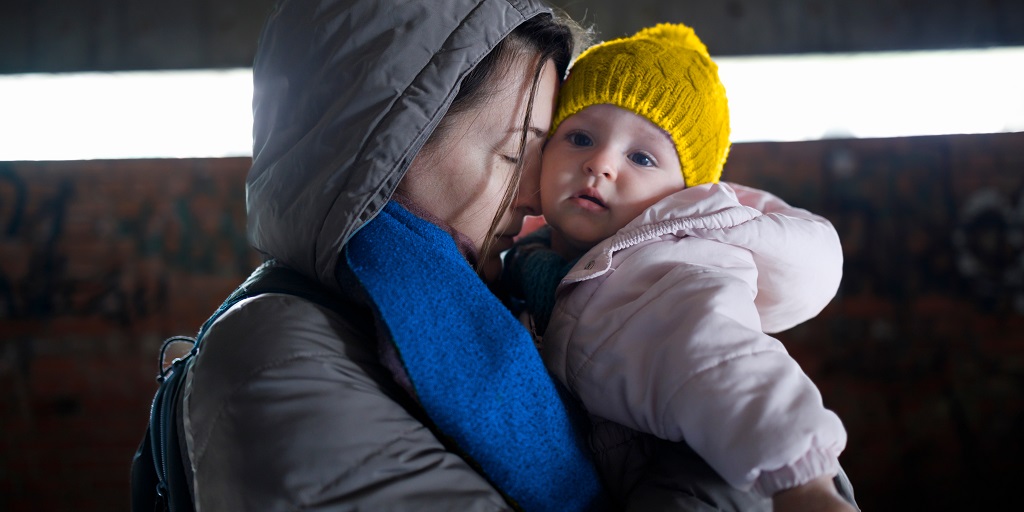The Biden administration announced on Monday that it would grant another year of temporary legal status for some Ukrainians who fled the Russian invasion for the United States before April 25, when the Biden administration rolled out the Uniting for Ukraine program.
The extension fixes an obvious injustice between Ukrainian refugees who arrived in the United States before the Uniting for Ukraine program started, and those who entered through that program. Under Uniting for Ukraine, people received humanitarian parole (a temporary form of status that authorizes someone to live and work in the U.S.) for two years. But those who fled earlier had only gotten one-year parole grants, many of which were on the verge of expiring.
As a result, some families who had reunited in the United States after fleeing Ukraine at different times faced the prospect of having to be separated again—or for one of them to leave prematurely when the other’s parole expired.
Last month, the Spokane Spokesman-Review profiled two such families: sisters Olena Nikora and Tetiana Sashchina, who fled Ukraine after the invasion while pregnant and arrived in the United States the week before Biden launched Uniting for Ukraine. They were given a year of humanitarian parole; their husbands, who arrived under the Uniting for Ukraine program in the fall, were given two years. Their infant daughters are U.S. citizens. “We live a day at a time because we don’t have clarity, we don’t have assurance of what’s happening,” Nikora said.
This week’s announcement gives Nikora and other Ukrainians a bit more assurance—but only a bit. Indeed, it points to a much bigger problem facing them and other groups the Biden administration has paroled into the country—such as Afghans airlifted here after the fall of Kabul in 2021, and more recently, people who have been approved under a new parole program for Cubans, Haitians, Nicaraguans, and Venezuelans (the “CHNV” program).
All together, there are about 226,500 such parolees, according to recent government statistics acquired by Axios—with more coming under the CHNV program every month. And all of them face the expiration of their legal status in the next few years, with no guarantee they’ll be able to find another way to stay in the U.S. legally after that.
Most Afghans with humanitarian parole face the risk of losing it in August of this year. Only a few of them have received permanent status—of the 77,000 Afghans paroled into the U.S. in 2021, fewer than 5,000 have been approved for asylum or Special Immigrant Visas. (That doesn’t count the tens of thousands of Afghans stuck outside the United States whose applications for parole were not approved. Immigration lawyers and advocates have pointed out that the U.S. has been slower and stingier in granting Afghans parole than Ukrainians.) The 113,000 Ukrainian parolees will face the same fate starting next year.
Some of these people would likely qualify for asylum in the U.S.—if they filed an application within a year of arrival. While the government does grant some exemptions due to extraordinary circumstances, people are generally barred from asylum if they wait more than a year to apply. But many would not. Simply fleeing war generally doesn’t count as grounds for asylum under U.S. law; you have to show that you’ve been persecuted on the basis of your identity or a characteristic particular to you. The risk of a gruesome death due to a war or other armed conflict alone doesn’t necessarily qualify you for asylum.
In theory, the goal behind the Uniting for Ukraine program—like the use of parole toward Afghans and the CHNV program—isn’t that people will apply for asylum and stay in the U.S. for good. The theory is that these are merely temporary stays in the U.S., after which people will return to their home countries.
Last year, it might have seemed reasonable that Ukraine would soon be safe to return to. Now, that seems less realistic.
The alternative—which has been used in the past after large groups of war refugees resettled in the U.S.—is for Congress to pass an “adjustment act,” giving all of them the chance to apply for green cards. Immigration advocates and veterans’ groups have been calling for an Afghan Adjustment Act since the fall of Kabul. But despite efforts by members of both parties to get it into a must-pass bill in 2022, Congress has so far failed to act on it. An adjustment act for Ukrainians is even more nascent.
In the absence of a permanent solution from Congress, the Biden administration will have to make a lot more announcements like the one it just made, automatically extending a temporary status without making it any less temporary. Or it will have to let some of its parole grants expire—forcing families to choose between living in the U.S. without status and going back to a homeland that may not yet be safe.
FILED UNDER: Ukraine


